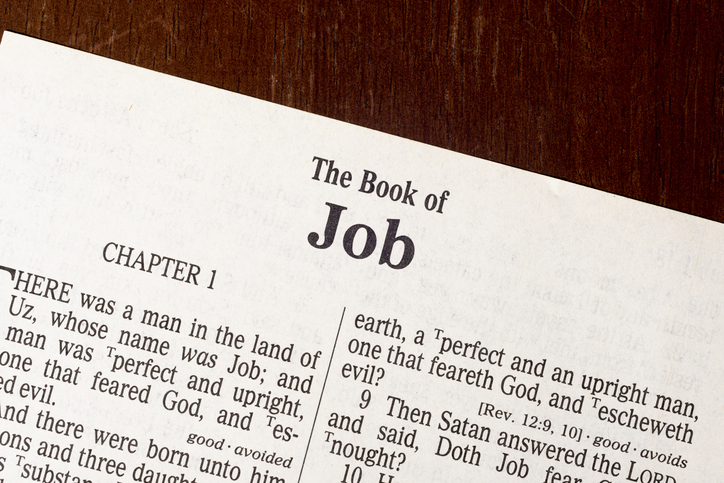Job and the point of a good life
June 20, 2025
Job is not a manual for how to live well. It’s a reflection on why one would want to.
The Book of Job is one of the most unsettling and sophisticated texts in the Bible – and perhaps the most honest. Even literalists tend to make allowances for it. It’s not quite allegory, but it’s clearly not history. It has the form of poetry, the structure of drama, and the function of philosophy. It opens with a man who is good in every conventional sense: blameless, ethical, devout, prosperous. Then it takes everything from him.
What follows is not a morality tale. It is a dismantling of moral tales. Job’s friends — respectable, well-spoken, and theologically confident — explain to him that suffering has a cause. That good people are rewarded, and bad people are punished. Their arguments are polished, familiar and completely useless. Job knows he has done nothing wrong, and he refuses to lie just to make their world make sense.
This is where Job speaks to our times. Contemporary Australia is a society that has moralised misfortune. If you’re struggling, you didn’t plan well. If you’re poor, you made bad choices. If you’re sick, maybe it’s lifestyle. The logic is neoliberal, but the impulse is ancient – comfort the fortunate by blaming the afflicted.
Job won’t have it. His protest — articulate, bitter, relentless — is not just personal anguish. It’s a political act. He refuses a worldview that ties virtue to reward. He refuses silence. He demands something better than explanation – he demands justice.
And then, famously, God answers – but not with reasons. Instead, Job is taken on a tour of a vast, wild cosmos that has never revolved around human expectations. The point is not that Job was wrong to protest, but that the world is more complex than any system of deserts and rewards. The rain falls where no one lives. The sea monster plays for no purpose. The universe, in short, is not a machine for delivering outcomes.
So what is the point of a good life? Job is not a manual for how to live well. It’s a reflection on why one would want to. In a society hooked on outcomes — whether performance targets, political polling, or personal optimisation — Job offers a quiet revolution: goodness is not a transaction. It is not a strategy. If it means anything, it must mean something in itself.
One wonders what the writer of Job would have made of 20th-century psychology. Perhaps they would have recognised something in the idea of intrinsic motivation. Job doesn’t persist because he believes he will be rewarded. He persists because he refuses to become someone else. His integrity isn’t a path to vindication. It is the vindication.
This is a confronting message in a culture that equates success with virtue. Job tells us: you can do everything right and still suffer. And if your worldview can’t handle that, it isn’t morality – it’s ideology.
At the end of the book, Job’s life is restored. Not as compensation, but as a kind of resurrection. The scars remain. The loss is not erased. But life goes on – not because it is fair, but because it is still worth living.
That is Job’s final gift: not an answer, but a refusal. He refuses despair, refuses moral dishonesty, and refuses to surrender his selfhood in the face of injustice. In this, he becomes a companion for those who still believe in truth, even when the world doesn’t reward it.
The views expressed in this article may or may not reflect those of Pearls and Irritations.


